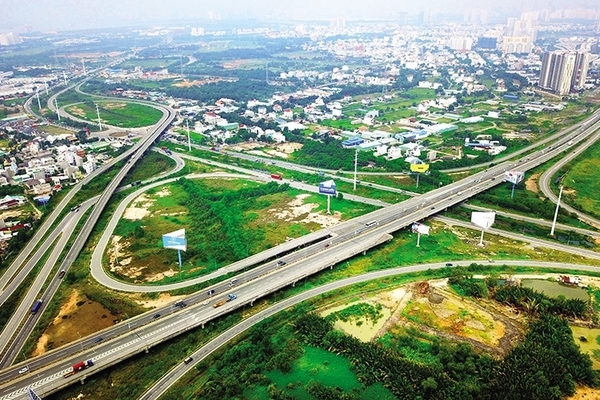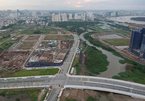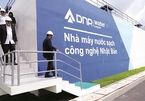 |
| The ambitious North-South Expressway will run over nearly 2,000 kilometres from Hanoi to Can Tho, connecting major economic hubs |
However, the bankability of this key national project remains in question amid various concerns from lenders.
Despite it being a month since the Ministry of Transport (MoT) announced cancellation of international bidding for eight public-private partnership (PPP) sections of the VND118.7 trillion ($5.16 billion) Eastern Cluster of the North-South Expressway, major interested contractors have not yet made any comment on the development.
Groups such as Daewoo, Lotte, and Hyundai may however be disappointed because their engineering and constructions arms had declared strong interest in the project as a part of boosting their presence in Vietnam. They were among the domestic, international, and joint venture investors, mainly from China, South Korea, France, and the Philippines, to file 60 prequalification dossiers for the eight PPP sections.
Nguyen Ngoc Dong, Deputy Minister of Transport, told VIR, “The result of international prequalification showed that four among the eight PPP sections have no international ventures, two others have one investor, and the rest have two to three domestic and foreign investors. This means low competitiveness. To encourage domestic investment amid unfavourable global changes, the MoT decided to make the cancellation.”
Who are the beneficiaries?
With the move, there are not more opportunities for international investors, paving the way for Vietnamese players to sign up. Thus far, six local investors, including Vinaconex, Deo Ca Group, and Tasco have filed dossiers.
To facilitate the involvement of domestic companies, and increase transparency and performance efficiency of the project, the MoT is working with the Ministry of Planning and Investment on adjusting criteria for capable investors, including financial capacity and experience.
With regard to investors’ equity, Vo Hoang Anh, an expert at Transport Engineering Design Inc., said that Decree No.63/2018/ND-CP dated May 2018 on PPP investment regulates equity at 11-12 per cent for the North-South Expressway, while the rate is 20 per cent required in the bidding document. Thus, this will cause difficulty for interested parties.
However, the main issue for domestic companies is now access to bank loans. Tran Van The, vice chairman of the Board of Directors at Deo Ca Group, is worried about the probability of providing loans worth over VND50 trillion ($2.17 billion) among banks for the project. An additional VND55 trillion ($2.39 billion) comes from state funding.
“At present, many banks said that their lending limit for build-operate-transfer (BOT) projects has hit the ceiling. Moreover, high deposit rates and unsolved problems related to BOT policies make them concerned, leading to tender guarantees and tightened credit disbursement,” said The.
A series of BOT transport schemes with better financial plans than the eight PPP sections are credit stuck, such as at Huu Nghi-Chi Lang, Van Don-Mong Cai, and Trung Luong- My Thuan. Many of them even halted construction for one to two years.
Despite the cancellation for overseas groups, it is too soon for domestic companies to celebrate – the MoT has even built a scenario of reporting to the National Assembly to use public investment for the expressway in the event that it fails to attract domestic stakeholders.
Until now, the nightmare for bad debts at BOT transport projects has made banks cautious, with some lenders saying they have no plans to offer loans to BOT or build-transfer projects this year. BIDV, Vietcombank, VietinBank, and SHB, among the four biggest funders of BOT projects, may take careful steps.
Along with local banks, foreign lenders are also wary of this kind of investment model, with the Asian Development Bank (ADB), Japan International Cooperation Agency (JICA), HSBC Vietnam, and Mizuho Bank, Ltd. among them. “We’e interested in some of those projects, but it may take time for the MoT to change the condition of prequalification and re-release tender documents. That’s why we have not advanced a financial approach yet,” said a representative of a Japanese bank in Hanoi.
“Vietnam’s PPP still need a guarantee and support from the government for debts, minimum payments, BOT termination cost payments, and foreign exchange conversion so as to facilitate project finance. Also, a reliable and clear PPP law is needed for foreign investors and financial institutions.”
Similarly, the ADB is still interested in the four northern sections of the North-South Expressway project to be developed under the PPP model, but remains concerned about the legal framework.
“We are seeing chances to develop PPP projects,” said Eric Sidgwick, ADB country director for Vietnam. “Our concern is to make sure that Vietnam can have a PPP framework that helps attract private sector financing.”
The JICA is also waiting for the actual result of new regulations, otherwise Japanese investors may hesitate because of the problems about guarantees, or other factors in the system.
Outline of policies
In a move to ease concerns over bank loans for the expressway project, Deputy Governor of the State Bank of Vietnam Dao Minh Tu said at a press briefing in early October that banks will help deal with funds for these PPP sections.
“The banking system will have responsibility for paying attention to and trying to make loan arrangements in consideration of capacity to balance bank capital, in order to ensure the security and efficiency of banks. On the other hand, ministries and localities need to clarify BOT-related policies to prevent possible risks about tolls, and location of toll collection stations among others,” said Tu.
He went on to explain that loans for BOT transport projects and expressways are huge, possibly reaching trillions of VND. Meanwhile, in banks’ capital structure, they are raising short-term capital so with mid-and long-term loans, and each project extending 10-15 years, the capital adequacy ratio remains a headache.
Tu’s explanation may hint at a difficult road ahead for BOT transport projects. BOT initiatives have been a controversial topic for years because of high risk of losses and lack of a completed legal framework.
Thus far, 39 projects have had tolls reduced, and 14 others upgrading existing roads have ground to a halt. The problems have brought about revenue losses to BOT operators, with some even facing risk of bankruptcy, leading to non-functioning debts.
According to reports made earlier from commercial banks, 32 per cent of BOT projects being exploited have not achieved revenue as planned. Meanwhile, loans for BOT transport initiatives are often huge and long term (often 15-20 years), while banks’ source of capital is mainly short term.
Dossiers will be issued this month, and the shortlist of the North-South Expressway will be completed in February 2020, with the bidding documents released and closed two months later.
If everything runs smoothly, capable investors will be announced next August, meaning three to six months later than the schedule earlier reported to the NA. VIR
Bich Thuy

HCMC to reclaim US$77.5 million from investor of 4 road projects in Thu Thiem
HCMC Chairman Nguyen Thanh Phong has approved a proposal to collect US$77.5 million in unpaid land-use fees from the investor that is developing four key road projects in exchange for land in Thu Thiem urban area project.

Big money poured into Vietnam's water supply projects
Big investments have been made in water supply projects, changing the face of the sector.
 Vietnam has closed its doors to international investors joining the Eastern Cluster of the North-South Expressway initiative, catering to domestic groups only.
Vietnam has closed its doors to international investors joining the Eastern Cluster of the North-South Expressway initiative, catering to domestic groups only.